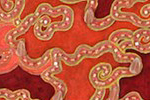Summer 2015: Prose
The Honor of Armadillos
Fiction by B. E. Scully
Specialist Gilman’s world had been reduced to picking up one raw, blistered foot at a time, putting it back down, repeating. Bravo Company had started the road march before dawn, and the woods walling each side of the road were still silent and black. The only sound was two hundred sets of TA50 gear clanking in time with the percussive thud of two hundred sets of boots. Gilman didn’t know where they were going, and he didn’t care — the only thing that mattered was picking up and putting down those aching slabs.
The soldier in front of him slowed down, and Gilman stumbled to avoid stepping on his heels.
“Step it out, Bodart!” Gilman hissed across the retreating darkness. He glanced around to make sure Platoon Sergeant Reese hadn’t heard him. Talking was forbidden on road marches: one hundred percent noise control, one hundred percent of the time.
Bodart turned around, and his glasses caught the light from Gilman’s red-lens flashlight. On road marches, every solider had to clip one to the front of his gear. When a company emerged from the darkness, hundreds of red laser beams went criss-crossing everywhere just like in the sci-fi films Gilman used to watch as a kid, the ones where armies of space-alien clones invaded planet Earth in order to exterminate the whole human race. With his oversized head and bulging bug-eyes, Bodart looked a little like one of those aliens himself. Gilman wondered for the hundredth time how Bodart had even made it through Basic Training. Bodart was one of those guys who somehow always managed to just pass the PT test or keep up on a road march or squad mission.
His dad had a name for soldiers like that — get-by guys.
“I’ve seen types like that walk right through a line of fire without so much as a scratch,” he used to tell Gilman. “I guess their heads are so far up their asses that bullets can’t get to ’em. I’m telling you, forget about that survival of the fittest bullshit. It’s the mediocre who really get by in this world.”
Maybe so, but his dad hadn’t survived two tours in Vietnam by being mediocre, and the box of medals in the attic proved it. Gilman knew about the medals from a few off-hand remarks his dad had made, but he’d never actually seen them until after his dad died and he’d been helping his mom clear out the house.
“Why didn’t dad ever show us these?” Gilman asked. “He knew how crazy Jimmy and I were for anything that had to do with Vietnam.”
“Once the house got crowded up with you kids, I guess we put them up here to get them out of the way.”
“It’s not like it’s just some box of old junk you could forget about! I’ll bet every single one of these has a cool story behind it that I never even heard.”
His mom picked up one of the medals and frowned. “I don’t think ‘cool’ is the word I’d use. In fact, some of the stories were just plain horrible.”
Gilman dug a medal out of the box, a tarnished star hanging from a red, white, and blue ribbon. It had a metal letter pinned to the top of the ribbon — “V” for valor. “This one’s the Bronze star. Cool.”
He picked up one that he didn’t recognize, a starburst on a faded cream and yellow ribbon. “What’s this one?”
His mom squinted through the stale, dusty air. “Oh, I don’t remember them all.”
“Which is why dad should have showed us these.”
His mom rubbed her fingers over the medal in her hand and then returned it to the box. “Your dad once told me that after he saw his first buddy get killed, he didn’t care that much for medals anymore. After he came back from Vietnam the second time, he cared even less. He always said all that fancy show-off stuff didn’t really matter.”
Some fancy stuff did matter, though. Gilman’s dad used to sit in front of the TV watching coverage of the first Gulf War. “Parades in the streets and ceremonies for a seven month war, and what did we get for sixteen years in Vietnam? Spit on in the same damn streets. Did I ever tell you what my commanding officer told me when I shipped home from my first tour?”
“No . . . ” Gilman trailed off, silenced by the familiar mixture of dread and anticipation that always accompanied his father’s stories about Vietnam. The feeling reminded him of the little neon packets his mom brought home from the grocery store each week, the ones that transformed an ordinary glass of water into sickeningly satisfying sugar bombs that left him craving more even as his stomach churned in protest.
“We’d already gotten orders not to wear our dress uniforms on the plane,” his father told him. “Can you imagine not being allowed to wear your country’s uniform on the way home to that same country? Anyway, when they told us not to hang it up in our car windows so as not to draw any attention, that was crossing the line. You’d better believe I hung that uniform up so that it filled the whole damn window top to bottom. And the loaded pistol on the seat next to me was going to take care of anyone who had a problem with that.”
Gilman knew what his father would have to say about a soldier like Bodart. He shook his head and gave a little snort as Bodart broke into a little shuffle in order to get back into line. Running on a road march was also forbidden, but it was better than falling behind and getting picked up by the trucks. If that happened, the only choice was to go AWOL or face a lifetime of shame. After all, who would want to go into combat with a soldier who couldn’t even keep up during a practice drill?
Into combat . . . Gilman liked the sound of those words, how the staccato clip of the syllables sounded like the real thing. The real deal, as Sergeant Reese liked to say. Soon Gilman was finally going to find out what the real deal was all about.
Their unit had been training for two and a half months. On most nights, the dry desert wind whipped so hard that everyone had to stay inside listening to the flimsy barracks walls groan in protest. Outside, soldiers’ tracks were wiped away the instant their boots left the ground, and there were constant briefings about getting lost and disoriented in the sandstorms. During the day, the heat rose up like a living, deadly thing. Gilman had come to hate the sun that stared down at them like a lidless, relentless Cyclops. At least one solider went down with heat exhaustion every day, and Gilman was waiting for his turn.
“If you can’t take the heat over here, how in the hell do you think you’re going to make it over there?” the First Sergeant would bawl, sweat streaming down his face.
Over there.
Those two words had taken over the base like an invading army, looming behind every order barked out by the NCOs, monopolizing every conversation in the chow hall, strutting and parading around the bars and clubs on weekends, sneaking into their bunks on sleepless nights to whisper in their ears — over there, over there.
For a long time, it seemed to Gilman like they might just stay in the desert forever, planning mock maneuvers against fake enemies, counting up make-believe casualties while swatting away horse flies and sneaking candy bars from the stashes hidden in their B.D.U. pockets. Then all of a sudden the NCOs had stopped joking around so much; the officers had started keeping to themselves more; when the base commander showed up to give a speech one afternoon, they’d all known the time had finally come.
After that, everyone started staying up long after lights out, calling girlfriends, wives, mom and dad or Aunt Sue or any-old-body who still cared about things like the drain pipes that needed replacing, or what little Joey was up to at school, or how it was supposed to be a hard winter again this year.
The flag flew at half-mast about once a week. As the countdown came down to months and then weeks, some kid in another platoon swallowed a handful of pain pills and tried to cut his wrists open with a steak knife. One of Gilman’s buddies in the ER told him that the kid was hardly even bleeding when they brought him in.
“You should have seen when his Platoon Sergeant came to escort him up to the psych ward. Wouldn’t even look at the kid. Still, he’ll be sleeping in his own bed while we’re stuck in some shit hole eating sand, so who’s the asshole, right?”
Gilman had a picture of his dad that he always kept in the right pants’ pocket of his B.D.U.s. It had been taken during his first tour in Vietnam and showed his dad with a non-regulation hat tipped back on his head, a machine gun slung casually over one shoulder, a cigarette sticking out of the corner of his mouth. He was staring dead into the camera as if to say, “Don’t even think about messing with this one, pal.”
But the cigarette turned out to be an even more determined enemy than the Viet Cong, and lung cancer eventually finished the job that bombs and bullets had failed to do. His dad hadn’t wanted a military funeral. In fact, he hadn’t wanted a funeral at all, and when a man pulled into the driveway in a beat-up truck and handed his mom a cheap plastic container and a flag that hadn’t been folded at all, let alone to proper military standards, Gilman could hardly believe that’s all there was to it. By the time he and his mom and brother scattered the ashes in the woods behind the house, it was as if the hard, cocky man with the machine gun only existed within the torn and ragged edges of the fading picture.
“Keep your Kevlars on your heads, no smoking, and don’t stick your arms out the back!”
The line of trucks loomed into sight, and Gilman realized that his last pretend road march was officially over. The next time there wouldn’t be any transport trucks to take them back to hot showers and clean sheets, but right now all those things still existed, and right now was all that mattered.
The ride back to base took them past a college campus. Huge trucks snorted and rumbled through town, belching smoke like steel beasts turned loose on a soft and unsuspecting society. Most of the guys walking by with their books and cell phones checked them out and then quickly looked away; some pretended not to see an entire convoy of trucks stampeding through their territory, which was even funnier.
The girls were different, though. They liked to stare in at the dirty, tired soldiers, and some even smiled and gave these awkward little half-waves, palms up and arms stiff as windshield wipers. Nobody ever waved back, though. Some of the guys pulled their Kevlars low and slouchy like the hard-asses in the movies always did, the kind who you knew right from the start would never break, not even when the camp got overrun and every man was down to his last bullet.
A girl balancing on a red bicycle waved at them. Her hair was high on her head in a ponytail, her legs smooth and brown.
“Think she’d be willing to have a go with a soldier this weekend? You know, a sacrifice for God and country?”
“She wouldn’t even let you sit on her dorm room floor.”
“No shit. She’s just glad you’re the one going off to the armpit of the universe, ’cause then her boyfriend doesn’t have to!”
“Bring back the draft is what I say — ”
They heard the familiar crunch as the truck lurched into the air and then thudded back down without slowing.
“Damn armadillos again.”
Road kill was high on the Company Commander’s list of threats to soldier readiness. Along with sandstorms and drunk driving, flattened armadillos and coyotes got regular mentions at the “safety hazard” speeches that came every Friday before weekend release.
“What’s up with those armadillos running into the middle of the road and then just stopping and staring at you, waiting to be smashed?”
“Maybe they’re suicidal like us.”
“Immediate discharge, lucky armadillo bastards!”
Gilman glanced out of the back of the truck in time to see the splattered remains in the middle of the road.
He had never felt more tired in his entire life.
On Friday night the exodus began toward the seedy motels that ring military bases like a cut-rate oasis of dripping air conditioners, cable television, and permanently drawn blinds. Most of Gilman’s platoon had already cleared out, but he wanted some time to just drive around in his truck. It was a cherry red beauty that had cost every dollar of his Basic Training money. He remembered how he could hardly wait to drive it back home on his first leave; none of his friends had anything as nice as this. They were all stuck working at some chain store or hauling shit around for somebody’s uncle. With fifteen pounds of new muscle and a truck of his own, Gilman couldn’t help thinking of his old crew as a bunch of kids messing around like they were still on summer vacation.
That had been less than a year ago. He should have put the truck in storage by now, but he kept putting it off. Now it was probably too late.
The sun was setting and the shadows were beginning their 3-D transformation of the hard daytime flatness. Gilman always thought of the desert as a hostile alien landscape full of lunar rocks and red dust and long stretches of nothing. He was far away from the base with miles of open highway ahead of him when something on the road caught his eye — an armadillo. It was easy enough to spot. Apart from some stray tumbleweed and endless stretches of telephone poles, there wasn’t anything else around as far as the eye could see.
The armadillo had wandered into the middle of the road and stopped. It was either too stupid or too scared to move, even with the truck headed straight towards it. Gilman stared at the animal. Then he stared at the telephone pole twenty-five feet off the right side of the road from where the armadillo was standing.
“In the desert,” Sergeant Reese always told them, “it’s near impossible to be sure what you’re looking at, even when it’s right in front of you.”
There were no other cars for miles around. Gilman pressed the gas pedal and watched the speedometer rise; his hands tightened around the wheel.
The armadillo stayed perfectly still. The truck hurtled forward even faster now. At the moment Gilman jerked the wheel to the right, he was completely blinded by the sun. The truck left the road in one long, angry squeal.
The armadillo, startled out of his stupor at last, scurried to safety and vanished in the high, rustling sage as if it had never even been there at all.
Gilman had ended up with a broken leg, a concussion, and a case of whiplash so bad that it was like a knife-stab every time he tried to move his head. It would take weeks of physical therapy to regain full motion, maybe months.
The retention N.C.O. stopped by one day to talk about his injuries and the possibility of a medical discharge—honorable conditions, of course.
“But that all depends on your recovery,” she told him. “The Army needs every soldier we can get right now. The doctors think they can get you squared away again good as new.” She caught his eye and paused. “But that all depends on you.”
Gilman hadn’t told the guys that part, though. Instead he told them one more time about the exhaustion from the field, his mind wandering on those lonely empty roads, the desert shadows that made you unsure what you were looking at even when it was right in front of you.
“An armadillo! You blew your chance at being a war hero for a damn armadillo! I can’t get over it.”
“That damn sun always in your eyes,” he said.
“Yeah, well, that telephone pole you managed to wrap your truck around was the only thing in the whole desert other than a couple of cactuses. Good thing for us you won’t be driving the Humvee.”
“So what are you gonna tell your grandkids when they ask what you did in the war?”
“He’ll tell them he helped save armadillos. At least that one lived to see another day!”
They all laughed and joked around some more and when the jokes ran out they left. The company was shipping out in a few days; Gilman knew he would never hear from any of them again.
Only years later, bored at home alone one afternoon and surfing old news stories about the war, would he learn about the roadside bomb that had blown off both of Platoon Sergeant Reese’s legs and killed three other soldiers. It had taken him a moment to connect an oversized head and bulging bug-eyes to the name of one of the dead.
The Platoon Sergeant Reese who didn’t yet know that bomb was waiting for him had come to see Gilman by himself. He’d shaken Gilman’s hand and told him what a damn shame it all was.
“You’re one of our best, son. We’ll sure as hell miss you over there.”
After he left, Gilman stared at the picture of his father for a long, long time. He thought about armadillos and ashes lost to the wind as if they’d never even been there at all.
Gilman wouldn’t have minded staying in the hospital except for the other patients. They were mostly wounded soldiers who had just shipped back—men and women without arms or legs, with faces bandaged, in wheelchairs. One soldier who sat in the hall outside his room had survived a mortar blast. The back of his head and neck were patterned with intricate crimson and white swirls, custom designed by flying shrapnel. As long as Gilman didn’t think about how they got there, the scars looked almost beautiful, like the Japanese yakuza tattoos that marked one for life as a member.
If anyone made eye contact with him, Gilman nodded to be polite, but he always looked away as quickly as possible.
Mostly he spent his time alone in his room, listening to the Army going about its business outside his window: morning PT, cadences, Reveille, sergeants’ shouts, soldiers marching. When a company came through, the hundreds of feet moving as one sounded like the whole world was passing him by. The hardest part came every night at twenty-hundred hour, when Taps wafted through the loudspeakers. Some people said the bugle sounded like it was crying, but Gilman always thought it sounded more like a soft but insistent request: Listen closely now, the hour is getting late . . .
And so Gilman listened to that old, old story, the soldier’s story of the crowded hour of life in quickened measure against the solitary moment of death. He listened to the last plaintive note sounding as long as possible until it became lost and indistinguishable from the wind.
| |

|

|
 |
 |
 |
 |
 |
||||
|
As hot as the summer sun, 13 poets breathe light into the darkness. |
Tending to the worn, imperfect edges of life, five writers grapple with perimeters. |
Like a swarm of bees or a flock of birds: four artists layer meaning through detail. |
Four teens observe their world and put words to page like only young voices can. |
From emerging to established writers – meet the women behind our seventh issue’s voices and visions. |

